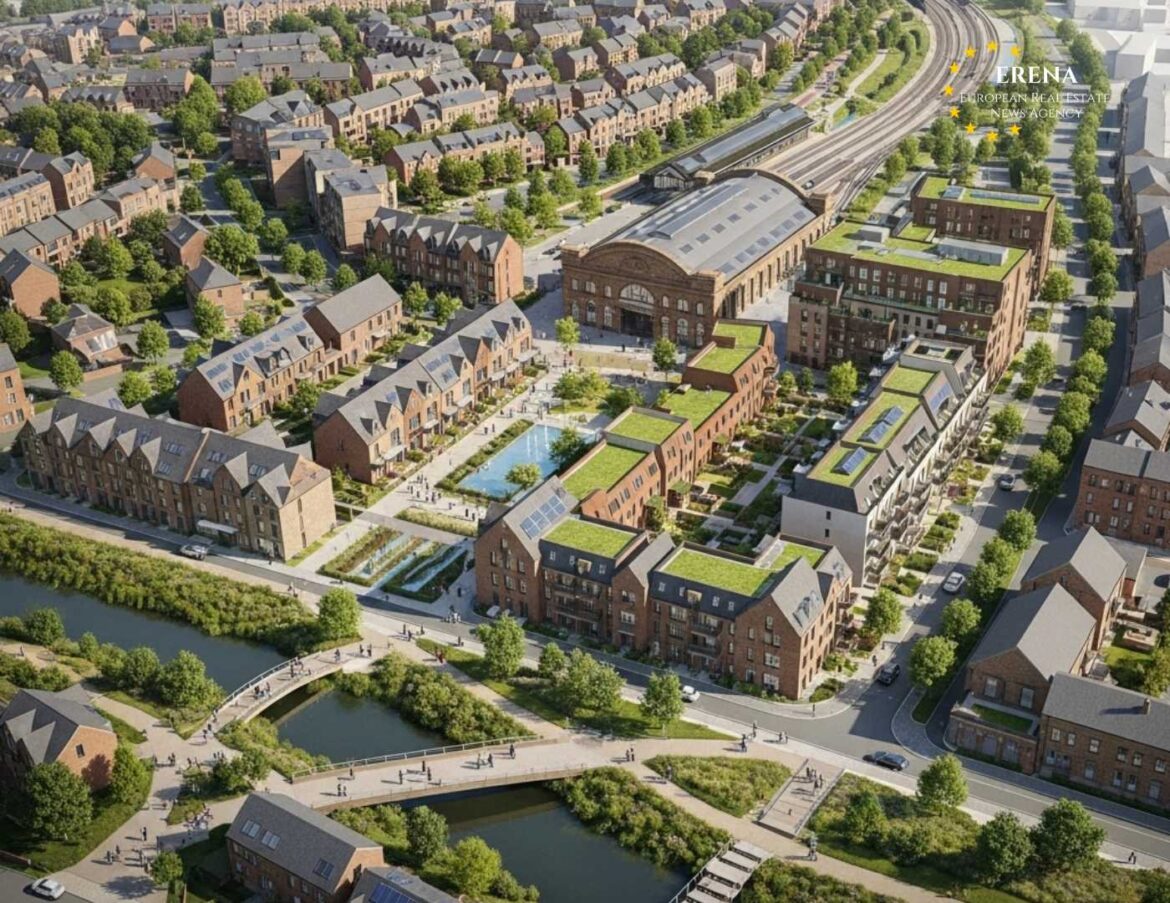A major urban redevelopment is taking shape in Birmingham as the historic Goods Station site is primed for transformation into a modern residential hub. With a projected value of £245 million (€285 million), the project is now actively seeking a build-to-rent (BTR) investment partner. The developers are betting on strong rental demand and the growing appeal of regional hubs to attract institutional capital into one of the city’s most significant regeneration opportunities.
Historic Site, New Vision
Located in the Jewellery Quarter, the former Goods Station site has long been identified as prime land for large-scale regeneration. Previously used for logistics and industrial purposes, the site stands as one of the last major redevelopment opportunities in central Birmingham.
Led by developer HUB in partnership with Bridges Fund Management, the proposal outlines a vibrant, mixed-use community comprising over 560 rental apartments. Beyond housing, the masterplan includes retail units, landscaped public spaces, co-working areas, and improved pedestrian and transport links to better connect the area to the wider city.
BTR Sector: Maturing and Expanding
Build-to-Rent — a housing model where units are developed specifically for rental — has seen rapid growth in the UK since the early 2010s. According to the British Property Federation, more than 270,000 BTR units are in the pipeline as of 2025. Birmingham ranks among the top three UK cities for BTR expansion, alongside Manchester and London.
With housing affordability under pressure and a shortage of quality rental stock, particularly for young professionals, the BTR model has become a magnet for institutional investors. Pension funds, insurers, and private equity firms see BTR as a defensive asset offering stable, inflation-linked returns — especially amid volatile equity markets and cooling demand in commercial real estate.
Project Highlights and Specifications
The Goods Station redevelopment will include:
- 569 rental apartments, with 80% designated for long-term leasing;
- Ground-floor commercial units, totaling approximately 2,000 m²;
- Resident amenities such as gyms, lounges, co-working areas, and communal gardens;
- Pedestrian-friendly streetscapes and integrated green infrastructure;
- Sustainable building features, including low-carbon materials and energy-efficient systems.
The developers have emphasized the project’s ESG credentials. From smart energy usage to socially inclusive housing, Goods Station is being marketed as a benchmark for sustainable urban living — tailored to meet the expectations of modern renters and impact-focused investors alike.
Financing Structure and Investor Outreach
Having secured full planning approval from Birmingham City Council, the project is now in the capital raising phase. The £245 million (€285 million) construction budget will rely heavily on external funding, ideally from a BTR-focused investment partner.
HUB and Bridges Fund Management are reportedly in discussions with multiple institutional backers. The investment structure is designed to be flexible — ranging from an outright forward-funding deal to a joint venture (JV) where capital and risks are shared.
Birmingham: A Rising Investment Magnet
Birmingham continues to strengthen its role as a UK growth hub. Major infrastructure investments, including the upcoming HS2 rail line, are enhancing the city’s appeal to young professionals looking beyond London. Rental prices, however, remain comparatively modest — averaging around €1,200 per month for a one-bedroom new-build apartment, compared to €2,100+ in London.
For investors, this translates into higher net yields. According to industry estimates, BTR developments in Birmingham can deliver 4%–4.5% annual returns, compared to sub-3.5% in some London zones.
Social Impact and Urban Renewal
Beyond profitability, the project promises broad social benefits. The apartment mix will cater to diverse tenant demographics, including affordable units for lower-income renters. By offering housing at multiple price points, the developers aim to support local inclusivity and retention of key workers.
Moreover, the construction phase is expected to create over 500 jobs, with up to 150 permanent roles in property management, retail, and hospitality once the complex is operational.
Construction Timeline
Should an investor be secured in the coming months, ground-breaking could begin as early as Q1 2026, with the first residents expected by mid-2028. Full buildout is projected to take up to four years.
The scheme will incorporate advanced construction techniques, smart technology for resource monitoring, and a tenant-centered property management model that focuses on long-term satisfaction and retention.
Conclusion
The £245 million Goods Station project in Birmingham stands as a symbol of the city’s next urban evolution — combining historic preservation, sustainability, and economic renewal. In a market defined by rising rental demand and constrained housing supply, this BTR-led initiative offers institutional investors a chance to anchor themselves in one of the UK’s most dynamic regional economies.
As the search for a backer continues, all eyes are on Birmingham to see whether this ambitious scheme can redefine the future of urban living and help bridge the rental housing gap across the Midlands.

